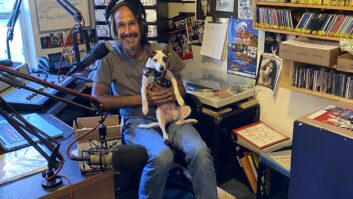When voiceover giant Nick Michaels died from a heart attack last month at the age of 67, radio lost one of its biggest fans and most ardent critics. But as anyone who really knew Nick will tell you, that’s exactly how Nick expressed his love — both directly and by investing the time to challenge your thinking.

Nick’s family laughs that even a subject as mundane as “How to Make Turkey Meatballs” could be deemed worthy of an argument.
On even meatier subjects, Nick’s rants were famous. He dared to tell clients they were wrong, then his talented writing and voice work would prove himself right.
“In the beginning, we argued about how hard he was on everybody who disagreed with him,” says veteran researcher and management consultant John Parikhal. They met at a hip party in Toronto in 1972, probably because Nick approved of Parikhal having changed the disc on the turntable to a Van Morrison LP.
“I’d say, ‘You can catch more flies with honey,’ and he’d say, ‘No, first I have to shatter their belief systems because they’re only going to really listen if I turn up the volume and turn up the ideas. Then, the ones who are still listening are the ones I want to work with.”
Radio programmers who hired Nick to be the voice of their stations sometimes got more than they bargained for. Nick would refuse to read bad copy, and the promotional scripts that most radio stations air were — in Nick’s opinion — just plain bad.
“Listen at 5, depend on us, enter to win — Nick thought phrases like those were completely ineffective,” says consultant David G. Hall, who hired Nick for Los Angeles stations KFI and KNX. “He referred to them as doggy commands.”
Instead, Nick believed in letting audiences draw their own conclusions. After southern California survived some scary wildfires, rather than chest pounding about around-the-clock breaking news coverage, “Nick dramatized the emotions of being told to evacuate your home, of quickly deciding which of life’s greatest treasures to pack, and he pointed out that our staff had done the same thing,” says Hall. “But then we came to work to get out the information that the community needed because, he said ‘We live here, too.’”

AN ALTERNATIVE TONE AND VOICE
Many listeners first experienced Nick’s understated tone in Chicago. Programmer Greg Solk had helped make WLUP “The Loop” iconic with a loud, bombastic style of rock radio that was emulated nationwide.
So when Solk needed to counter with a different approach to launch WDRV in 2001, Solk asked Nick to be the voice — and conscience — of “The Drive.” Nick knew how to cut through the clutter, explaining, “In the over-communicated world, a whisper becomes a scream.”
Nick quickly demonstrated that the upstart rock station “understands” the artists by telling stories that matched the emotions of their music. “Do you know what made ‘Start Me Up’ by the Stones such a great song?” Nick asked “The Drive” Production Director Matt Bisbee. “The feeling it gave you.”
During the Iraq War in 2003, Nick’s promo conveyed the complicated emotions of the time using the Crosby, Stills & Nash song “Find the Cost of Freedom” as a backdrop. Nick explained that understanding the war — as KFI listeners did — was important because “History repeats itself.” The audio was so poignant and moving that none other than Barbra Streisand requested a copy.
In 1985, Nick called Parikhal, whispering, “You must promise you’ll never tell a soul about this,” and he never has until now. Having signed an ironclad non-disclosure agreement, Nick knew he could trust his best friend with the news that Coke was about to change its classic flavor.
When Nick was asked to voice the announcement, he reportedly ranted, “Coca-Cola is the only thing that unites my grandmother, my mother and me. We all drink Coke. You’re about to change something that bonds generations, the fabric of America. This… will… not… work!” He eventually, reluctantly, read the copy. He then ad-libbed some lines that were supposedly from God himself, because — Nick insisted — only a heavenly intervention would be reason enough to change the formula of Coke.
For now, the work that probably made Nick proudest, his storytelling rock program “The Deep End With Nick Michaels” is still airing in syndication, produced by Terry Gangstad. Whether and how to continue is under discussion.
“I’m not sure that there’s anybody left, Dave,” says Parikhal. “Nick Michaels was such a bright burning candle in the darkness that — to Nick — radio had become. That may be the way that we can remember him.”
Maybe we can keep that flame alive. On every opportunity, rather than talk about ourselves, we can make true connections with others by turning the conversation toward them, their lives, and their true feelings.
As the former program director of “100.3 the Sound” in Los Angeles, Dave Beasing gives Nick Michaels much of the credit for giving the legendary station its musical credibility. Dave can be reached at his new venture, SoundThatBrands.com.

NICKISM [NIK-IZ-UHM]
Noun — 1. Sentence or phrase that Nick Michaels uttered often.
Here are some sample Nickisms, compiled by Matt Bisbee of Hubbard Radio Chicago:
• “It’s not about us; it’s about them.”
• “Tell a story. If you make it real, the listener will follow.”
• “Write loudly and speak softly.”
• “What the audience discovers is more important than what they’re told.”












